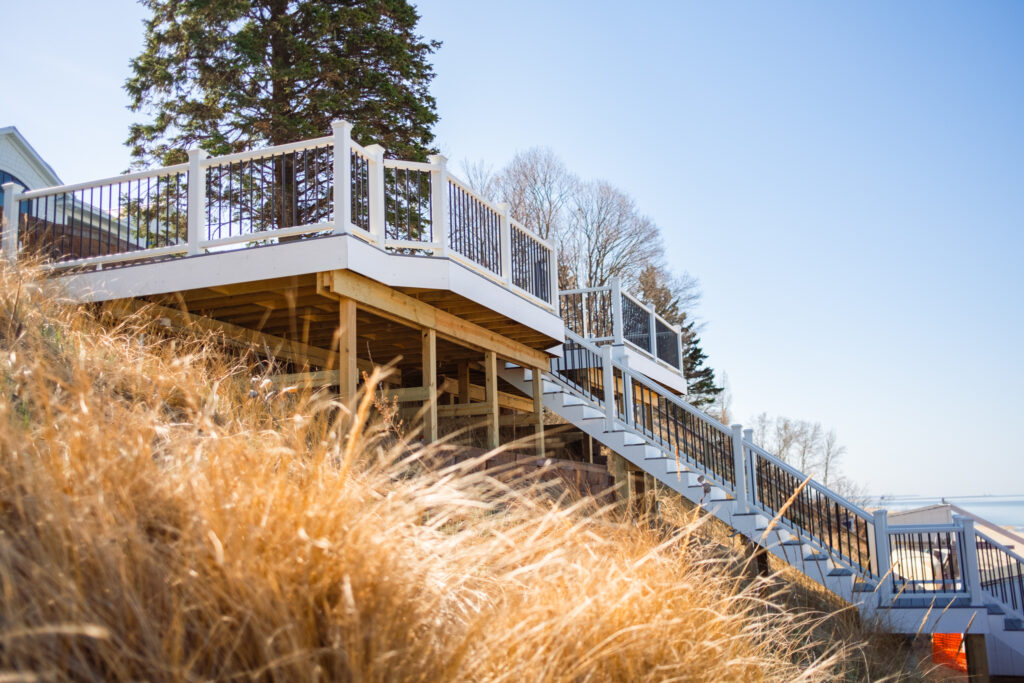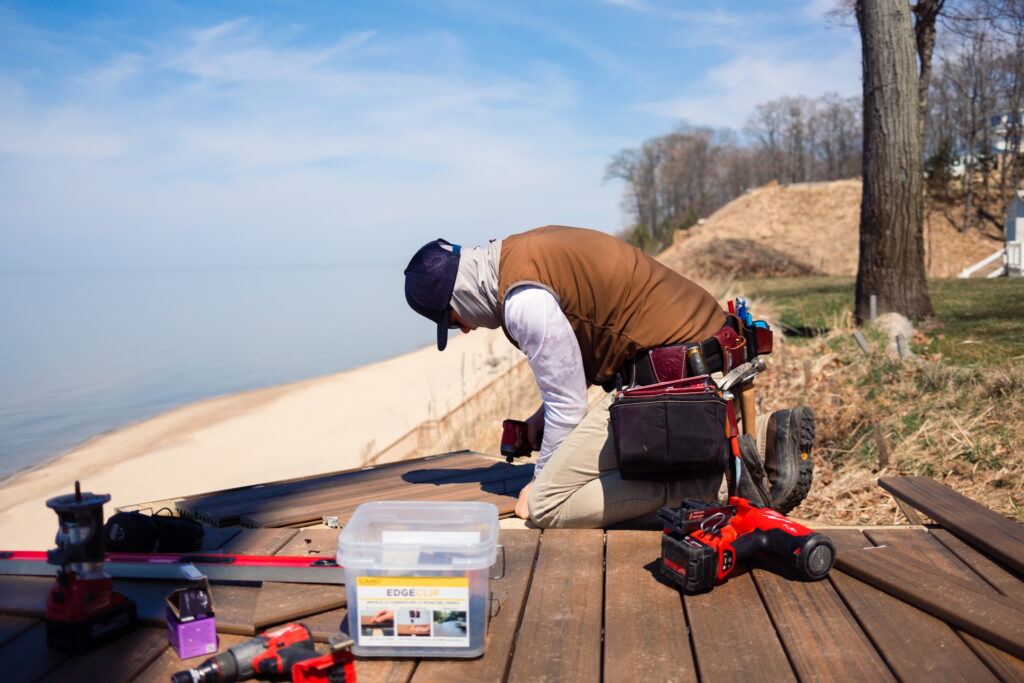Can You Build a Deck in the Winter?
Here are 9 Unexpected Reasons You Should Consider It.
Have you ever considered building a deck in the winter? Many people assume that it’s too cold to take on any major outdoor projects, but we hope this blog changes your mind!
Can I build my deck in the winter?
Yes! Not only can you build your deck in the winter, but it’s also more ideal than waiting until spring or summer. It may seem counterintuitive, but several reasons suggest that the best time to build a deck is in the winter.

9 Reasons You Should Build Your New Deck in the Winter
1. Save Money On Material and Labor Costs
Low demands in the winter often lead to discounts!
Deck material suppliers can sometimes lower their prices in the winter because the demand isn’t as high. The same can be true for your contractors. Since winter is not usually a busy time for them, the cost of building a deck might be lower than usual.
2. Contractors Have More Availability in the Winter
Less work leads to more availability!
Because winter is the off-season for most contractors, it’s easier to secure a spot in their schedules and start your project promptly.
3. Installation Is Easier When You Aren’t Using Your Space
Avoid recreational disruptions!
The best time to build a deck is often while you and your family aren’t using that space. That way, construction won’t interrupt outdoor activities like bonfires, BBQs, and summer parties.
4. Secure Permits More Quickly in the Winter
Less demand means faster turnaround times!
Getting the necessary permits can take some time in the summer. However, with fewer people requesting building permits in the winter, you should be able to secure them more promptly.
5. Have Minimal Effect on Your Property
A firmer ground protects your property!
Your landscaping won’t be as affected by foot traffic in the winter months. A firm ground with dormant grass means any damage to your turf will likely start growing again by spring.
6. Cold Temperatures Are Better for Installing Wood
Avoid wood warps, cracks, splits, and twists!
The summer heat can damage wood boards, causing swells and warps that are hard to work with during installation. But the cold winter temperatures prevent the boards from expanding, making them easier to install.
Note: This doesn’t apply to non-wood decking materials like composite, PVC (polyvinyl chloride), and aluminum.
7. Winter Provides Optimal Curing Conditions
Give pressure-treated lumber time to completely dry!
Decks built with pressure-treated composite or timber need time to cure, evaporating the moisture contents from inside the boards. This process can take a few months in low humidity, and even longer in high humidity. Because of that, winter provides the perfect conditions.
8. You’ll Get Better Results When Staining Your Wood Deck
Avoid streaking, cracking, and peeling when staining!
During winter, the dry air and cold weather prevent the wood from absorbing moisture and causing cracking, peeling, or streaking in the stain. However, there is such a thing as too cold. You will want to avoid staining once temperatures get below 50°F.
9. Your New Deck Will be Ready To Use By Spring
Use your new deck on the first warm day of the season!
When you build your new deck in the winter, it will be ready to enjoy as soon as the weather turns warm. Not to mention, you’ll have plenty of time to personalize your deck before hosting any outdoor gatherings spring may bring.

Frequently Asked Questions About Building a Deck in Winter
When is it too cold to stain a deck?
Any temperature below 50°F is too cold to stain a deck. While cooler temperatures and low humidity can help you avoid cracking, peeling, or streaking, freezing temperatures can interfere with adhesion.
What happens if you apply stain when it’s too cold?
Applying stain to your deck when it’s too cold (Below 50°F) can interfere with the cure of the coating. This can lead to adhesion and durability issues like cracking and peeling.
Does wood expand in winter or summer?
Wood is most likely to expand in the summer. High temperatures and direct sunlight can cause swells, warps, cracking, and splintering. In contrast, the winter’s colder temperatures prevent wood from expanding.
Can I install composite decking in the cold?
Yes, you can install composite decking in cold weather! Because composite decking is resistant to moisture and freezing temperatures, it doesn’t need to be sealed or winterized. Not to mention, the hard ground makes digging post holes and pouring concrete footings easier. These advantages make both Autumn and Winter perfect for installing your composite decking.
Build a Deck With Lakeshore Customs This Winter
As Michigan deck builders, we’ll customize your deck based on your property’s unique geography and your unique preferences. This includes custom-built landings, custom measurements, cable railings, built-in benches, hose fixtures, lighting, and more.
Let us know how we can build your dream deck this winter!
While ‘Lakeshore’ is in our name, we build and install decks and stairs throughout Michigan, not just along the lake. You can find our work near you in:
- Allegan, MI
- Benton Harbor, MI
- Cascade, MI
- Fennville, MI
- Grand Haven, MI
- Grand Rapids, MI
- Hart, MI
- Holland, MI
- Kentwood, MI
- Manistee, MI
- Muskegon, MI
- Norton Shores, MI
- Pentwater, MI
- Rockford, MI
- Saugatuck, MI
- Shelby, MI
- South Haven, MI
- Traverse City, MI
- Walker, MI
- West Olive, MI

